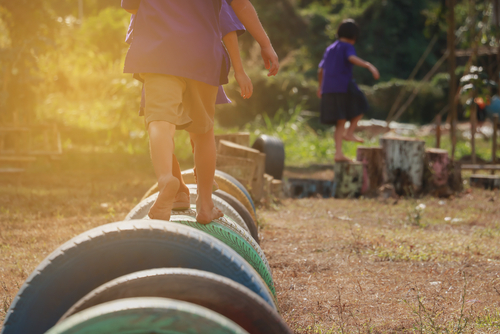Three essential benefits to outdoor play

With more and more children spending bigger and bigger slices of their time in front of screens, the benefit of outdoor time in school playgrounds seems to be increasingly axiomatic. Whether its video games, videos of people playing video games, traditional television, streaming movies, or any number of other more sedentary habits, if people can get their children outside to play, they grasp the chance with both hands.
But it’s not just exercise. The importance of outdoor playtime, in spaces specifically planned for it with some interesting playground design ideas in play, is widely understood by teachers, parents, and other education professionals.
In 2010 the Learning through Landscapes report found “97% of teachers believed that schools needed to use their outside spaces effectively to enhance their pupils’ development, 82% did not agree that their own school was making as much use as it can of this valuable resource”. Earlier Ofsted documents concurred with their findings. The education standards regulator stated in 2008 that “When planned and implemented well, learning outside the classroom contributed significantly to raising standards and improving pupils’ personal, social and emotional development”.
When children go outside to play, and play in spaces specifically meant for them, marvelous things can happen. Everyone that works in education knows that learning through play is the best way to acquire knowledge. Plus, children love playing! These three benefits are crucial to children’s development, achievement, and happiness.
Imaginative development
In a playground with a set of swings, a slide, or perhaps an elaborate climbing frame, as well as the obvious exercise advantages, all the equipment gives children a framework to drape their imaginative play over. Maybe the tunnels that run between and around the slides are in fact the secret passageways into the evil emperor’s castle, or maybe the slide is the ejection chute for their spaceship’s life pods. This is often why the designs of structures in playgrounds often go down one of two paths. Either they are aggressively themed, to encourage imaginative games of a specific kind, or they are so abstract and unusual that any number of different games could be played there.
This all has tremendous benefit for children’s mental and social development. When children have to play an imaginative game as part of a group, they have to communicate in a shared way about something that they can only see in their own minds. This is the kind of problem adults encounter in the working and homelife world all the time. Whether it’s a company strategy, a project, or something as ephemeral as a mission statement. In developing the skills to imagine together, children are growing up and learning to be effective individuals in a group. Giving them the play equipment to make this happen is vitally important.

Escape environment
As children get older, they will face more and more of the pressures of the education system. Homework, tests, exams, coursework. While it is of course absolutely essential that they dedicate all the time they possibly can to these tasks, they also need to know how to let themselves go. How to rest in an active way through play. The skills they develop in this regard when they are using play equipment allow them to let loose anxieties and nervous energy. If they know how to do this when they are very young, the skills will be very well engrained in their later years.
Independent experience
When children see play equipment designed for them. Equipment without instructions, without obvious supervision, without anything except their own minds telling them how to have fun with it, they get to develop their own ideas about what fun is, how it works, and what it means. This kind of experience is deeply valuable in giving children the confidence they need to navigate the world more widely. As adults, we are very often, if not most of the time, presented with situations without a guide, or direct authority. Playing on a set of playground equipment, especially if it’s more abstract, more off the wall, and more needing interpretation, is ideal training for these kinds of experience.
Whenever your children enjoy a playground, you’re not just watching them take time out from learning. You’re watching them growing, developing, and turning into a powerful and unique individual.




